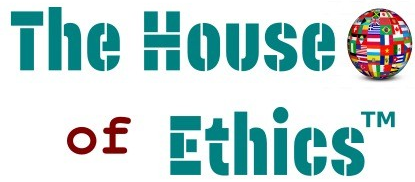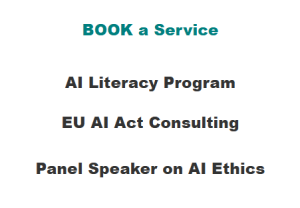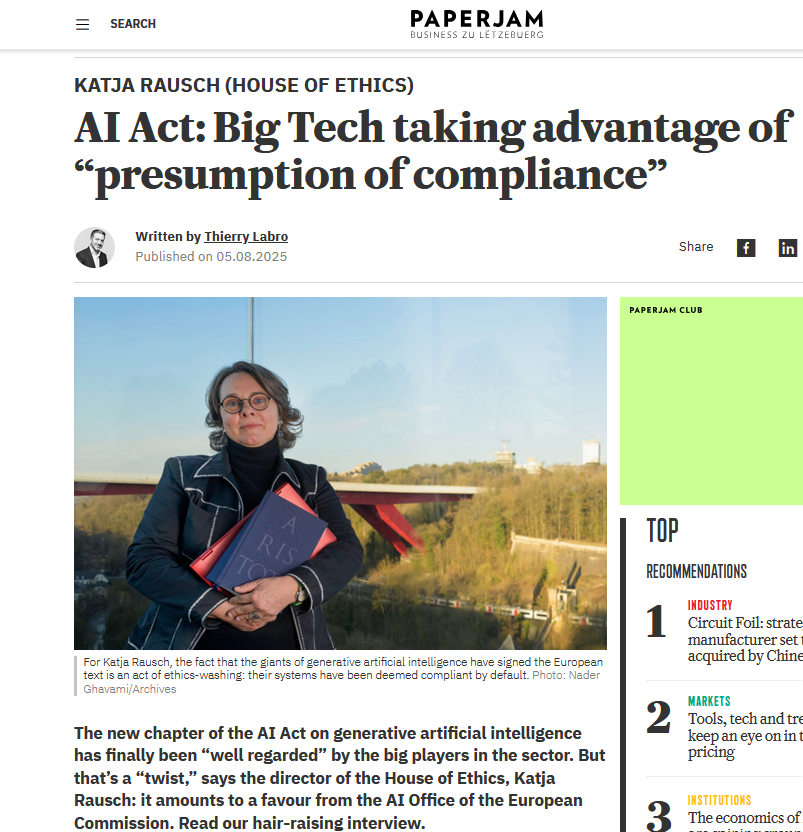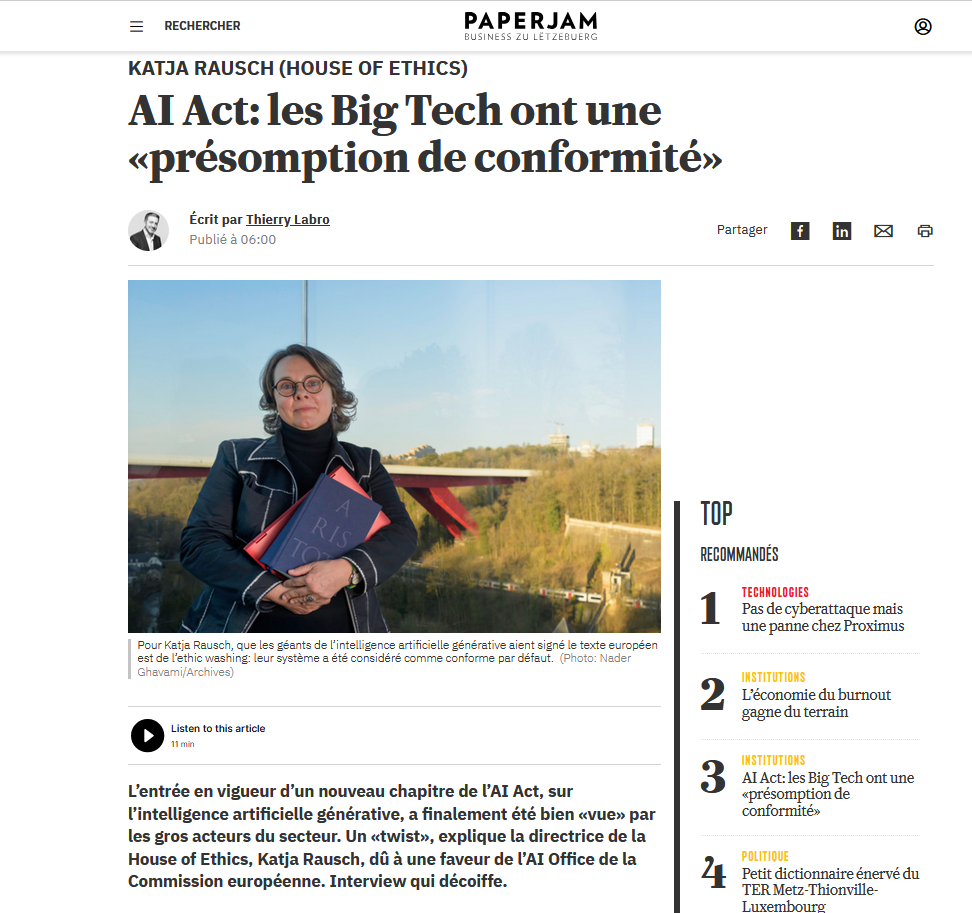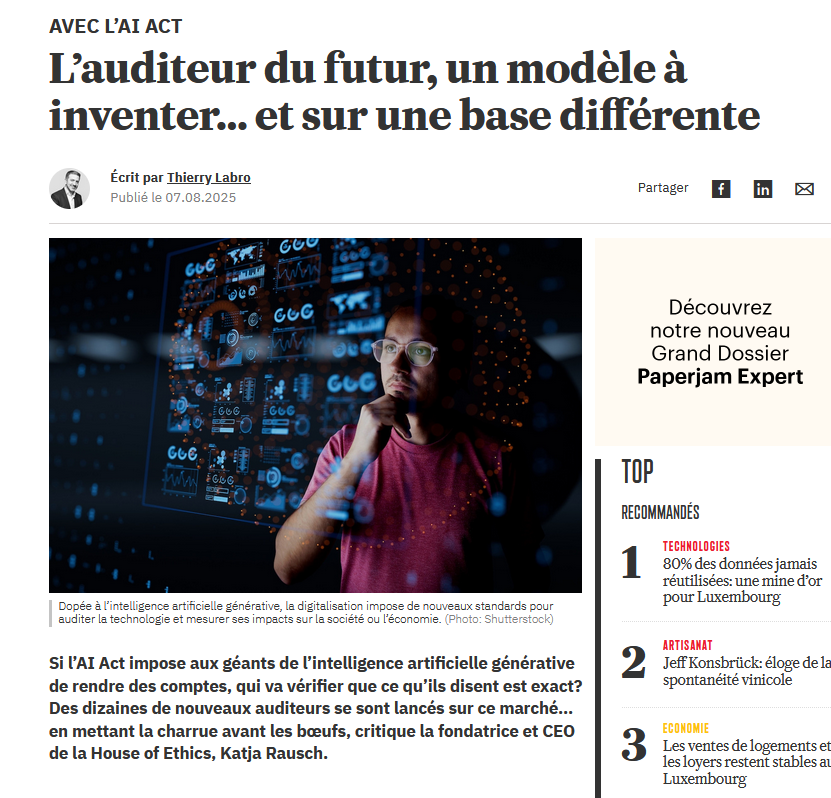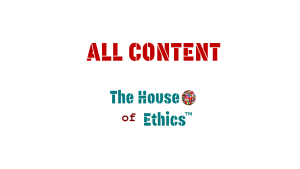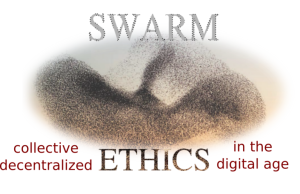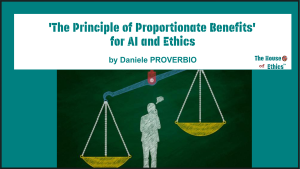📯JUST OUT 🆕 — Interview with The House of Ethics™ by Thierry Labro, Editor-in-Chief of Paperjam on the #AIAct and its unexpected peripheries…
——
Did you know 💡
——
📢 that on April 9, 2025, the European #Commission published the so-called “AI Continent” action plan to push the EU as world leader in artificial intelligence (against competition from the US and China) .
Mainly to recalibrate the AI Act towards a more competitive angle. A word analysis of the “AI Continent” action plan has revealed that the word “innovation” appears a stunningly 62 times!
📢 that on July 10, 2025, a General-Purpose AI (#GPAI) #Code of #Practice to the AI Act has been published. Why?
To allow all signatories, and mainly #BigTech, to benefit from an “#presumption of #compliance” to the AI Act. By signing all AI players commit bona fide to respecting #copyright, #transparency and #security in the development of their models.
#XAi from #Musk partially signed and #Meta refused to sign, explaining that Europe is currently on the wrong track. Funny 🤡, from a company (ex #Facebook) that was behind #Cambridge #Analytica, the biggest data theft scandal — and a company (#Facebook again) dubbed a “digital gangster” in the report “Disinformation and ‘Fake News’” by The Digital, Culture, Media and Sport Committee (2019).
📢 So why did they all (#OpenAI, #Microsoft, #Anthropic, #Google, #MistralAI, #IBM, #HumaneTechnology, #Amazon) eagerly sign?
Simply because signatories to the #Code or harmonised (technical) #standards will have ‼️‼️‼️ 1 year’s reprieve‼️‼️‼️ before incurring penalties for non-compliance with the AI Act.
Meaning they benefit from a “presumption of compliance” that their systems comply with the AI Act, while still being in flagrant violation in practice.
——————————
More to read at #paperjam‘s website… 📰
… also discover in the article by Thierry Labro what is not covered by the AI Act, and what #PEOPLE actually think about regulating AI.
And how #decentralized and #collective #ethics can be a powerful driver towards #responsible and #sustainable AI as well as novel ways of #governance.
🎯 #AILiteracy Program by The House of Ethics™
L’entrée en vigueur d’un nouveau chapitre de l’AI Act, sur l’intelligence artificielle générative, a finalement été bien «vue» par les gros acteurs du secteur. Un «twist», explique la directrice de la House of Ethics, Katja Rausch, dû à une faveur de l’AI Office de la Commission européenne. Interview qui décoiffe.
Que pensez-vous du texte? Où sont ses forces et où sont ses faiblesses?
Katja Rausch. – «Quand Bruxelles a commencé l’élaboration et la négociation de l’AI Act il y a cinq ans, les législateurs ont essayé d’aboutir à un texte général qui proposerait un juste équilibre entre innovations liées à l’intelligence artificielle (IA) avec vue sur les bénéfices liés à l’IA et tous les risques qu’elle apporterait. Le résultat étant un texte dit “risk-based” avec des systèmes de l’IA catégorisés en quatre types de risques: minimal ou pas de risque (permis), risque de “transparence” comme les chatbots (permis avec obligations d’informations), haut risque (permis avec obligations de conformités – la “conformity assessment procedure” pour avoir des labels CE par exemple), risque non accepté (prohibé, reconnaissance faciale, scoring social).
Et puis, il y eut l’électrochoc du rapport Draghi “The Future of European competitiveness” concluant sur une Europe à la traîne de la révolution digitale, voire freinant l’innovation avec ses 100 et quelques lois digitales, répertoriées par Kai Zenner. [lire plus…]
The new chapter of the AI Act on generative artificial intelligence has finally been “well regarded” by the big players in the sector. But that’s a “twist,” says the director of the House of Ethics, Katja Rausch: it amounts to a favour from the AI Office of the European Commission. Read our hair-raising interview.
Paperjam: What do you think of the text? What are its strengths and weaknesses?
Katja Rausch: When Brussels began drafting and negotiating the AI Act five years ago, the legislators tried to come up with a general text that would strike the right balance between innovations linked to artificial intelligence with a view to the benefits linked to AI and all the risks it would bring. The result is a so-called “risk-based” text with AI systems categorised into four types of risk: minimal or no risk (permitted); “transparency” risk such as chatbots (permitted with information obligations); high risk (permitted with compliance obligations, e.g. the “conformity assessment procedure” to have CE labels; and risk not accepted (e.g. facial recognition, social scoring).
And then there was the shock of the Draghi report, “The Future of European Competitiveness, which concluded that Europe was lagging behind the digital revolution and even holding back innovation with its 100 and some digital laws, listed by Kai Zenner. [read more…]
Si l’AI Act impose aux géants de l’intelligence artificielle générative de rendre des comptes, qui va vérifier que ce qu’ils disent est exact? Des dizaines de nouveaux auditeurs se sont lancés sur ce marché… en mettant la charrue avant les bœufs, critique la fondatrice et CEO de la House of Ethics, Katja Rausch.
Eticas Consulting, Zetane Systems, Truera, Data & Society ou Babylon Technologies: aux côtés des acteurs classiques de l’audit qui ont une offre, comme PwC ou EY, ou de la technologie, comme Capgeminini, une flopée d’entreprises sont nées face au boom de l’intelligence artificielle et à l’intuition qu’il faudrait bien, à un moment donné, mettre les mains dans le cambouis des black-box pour comprendre comment elles fonctionnent et comment elles peuvent perturber les équilibres démocratiques ou économiques.
«Il existe 245 méthodes d’audit, mais aucune ne pourra à l’heure actuelle faire un audit miroir ou prédictif des systèmes deep tech, de l’IA générative ou des modèles de diffusion qui fonctionnent en mode de tokenisation probabiliste, donc imprévisible. Au-delà du manque d’outils, ce sont surtout les profils capables de maîtriser la complexité technologique qui font défaut : ceux qui comprennent l’interaction entre ERP, API, systèmes propriétaires, sans oublier les nouvelles IA génératives qui opèrent dans l’opacité de la black box », assène d’emblée la fondatrice et CEO de The House of Ethics, Katja Rausch. «Certes, les auditeurs appliquent les analyses des données, font des rapports de modèles, des tests de sécurité (avec le secteur financier étant le plus abouti), mais l’audit traditionnel comme méthode ne passerait pas son propre audit.» [Lire plus…]
Spécialisée dans l’éthique des nouvelles technologies, Katja Rausch travaille sur les décisions éthiques appliquées aux domaines tels l’intelligence artificielle, la data éthique, les interfaces machine-homme, la roboéthique ou la Business éthique.
Pendant 12 ans, Katja Rausch a enseigné les Systèmes d’Information au Master 2 de Logistique, Marketing & Distribution à la Sorbonne et pendant 4 ans les Data Ethics au Master de Data Analytics à la Paris School of Business.
Diplômée de la Sorbonne, Katja Rausch est linguiste et spécialiste en littérature du 19ème siècle. Partie à la Nouvelle-Orléans aux États-Unis, elle a intégré la A.B. Freeman School of Business pour un MBA en leadership et enseigné à Tulane University. À New York, elle travaille pendant 4 ans pour Booz Allen & Hamilton, management consulting. De retour en Europe, elle devient directrice stratégique pour une SSII à Paris où elle conseille, entre autres, Cartier, Nestlé France, Lafuma et Intermarché.
Auteure de 6 livres dont un dernier en novembre 2019, Serendipity ou Algorithme (2019, Karà éditions). Elle apprécie par-dessus tout les personnes polies, intelligentes et drôles.
- Katja Rausch
-
